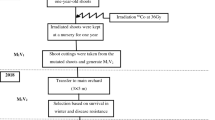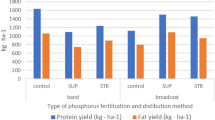Abstract
AT Ballochraggan, which is an area of rough hill pasture near the Port of Menteith, Perthshire, several small patches of an abnormal type of bracken were observed. The plants in these patches had a characteristic appearance, the fronds being yellow in colour, and not so robust as those of normal bracken of the same age. The sporing capacity of the plants was small, and the fronds died prematurely, being partly withered by the beginning of September. At that time their rhizomes were examined microscopically and they were found to contain smaller reserves of starch than did normal rhizomes of the same age. This difference in starch content was most marked in extreme cases of chlorosis.
This is a preview of subscription content, access via your institution
Access options
Subscribe to this journal
Receive 51 print issues and online access
$199.00 per year
only $3.90 per issue
Buy this article
- Purchase on Springer Link
- Instant access to full article PDF
Prices may be subject to local taxes which are calculated during checkout
Similar content being viewed by others
Author information
Authors and Affiliations
Rights and permissions
About this article
Cite this article
HUNTER, J. A Chlorosis of Bracken due to Manganese Deficiency. Nature 150, 578–579 (1942). https://doi.org/10.1038/150578a0
Issue Date:
DOI: https://doi.org/10.1038/150578a0
This article is cited by
-
Fusarium wilt of pigeon pea
Proceedings / Indian Academy of Sciences (1963)
-
The essential nature of certain minor elements for plant nutrition. II
The Botanical Review (1947)
-
Grassland Improvement
Nature (1944)
Comments
By submitting a comment you agree to abide by our Terms and Community Guidelines. If you find something abusive or that does not comply with our terms or guidelines please flag it as inappropriate.



